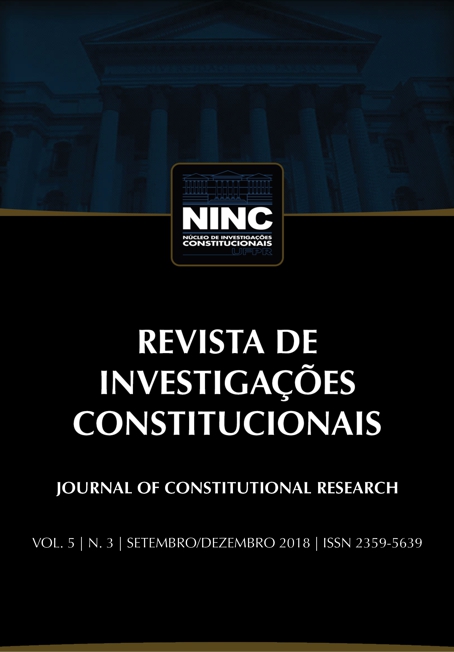Transforming the legislative: a pending task of Brazilian and Colombian constitutionalism
DOI:
https://doi.org/10.5380/rinc.v5i3.60977Keywords:
transformative constitutionalism, representative democracy, judicial review, political institutions, comparative constitutionalism.Abstract
The Constitutions of 1988 in Brazil and 1991 in Colombia have instantiated a complex process of transformative constitutionalism associated with the protection of rights, and the inclusion of minority groups. In spite of the prominent role of the judiciary in these processes, it should be stated that these Constitutions recognized the importance of the legislative branch within the transformations they seek to achieve. The question that remains open is whether a strong intervention by the judiciary is instrumental to put the legislature back in shape and put it in tune with the transformation that both Constitutions seek to achieve. As this paper will show, despite the good decisions delivered when deciding particular cases, overall, transformative constitutionalism based on the prominent role of the Courts has not been that transformative in terms of reforming political institutions. In this sense, what this paper seeks to highlight is that, in order to develop an adequate theory on judicial review, it is crucial to truly identify the limitations of constitutionalism and what judicial review can and cannot do.
References
ADLER, Matthew; DORF, Michael. C. Constitutional Existence Conditions and Judicial Review. Virginia Law Review, vol. 89, n. 6, 1105-1202, Oct. 2003.
BAUMAN, Richard; KAHANA, Tsvi. The least examined branch. Cambridge: Cambridge University Press, 2006.
BONILLA, Daniel (ed.). Constitucionalismo del Sur Global. Bogotá: Siglo del Hombre Editores. 2015.
BRADLEY THAYER, James. The Origin and Scope of the American Doctrine of Constitutional Law. Harvard Law Review, vol. 7, n. 3, Oct. 25, 1893.
CHRISTIANO, Thomas. The Authority of Democracy. The Journal of Political Philosophy, vol. 12, n. 3, 2004.
BRASIL. Constituição (1988). Constituição da República Federativa do Brasil. Brasília, DF: Senado Federal: Centro Gráfico, 1988.
DALY, Tom Gerald. The Alchemists: Questioning our Faith in Courts as Democracy-Builders. Cambridge: Cambridge University Press, 2017.
DORF, Michael C.; SABEL, Charles F. A Constitution of Democratic Experimentalism. Columbia Law Review, vol. 98, n. 2, Mar, 1998.
DWORKIN, Ronald. The forum of principle. New York University Law Journal, vol. 56, n. 469, 1981.
ESTLUND, David (et. Al). The Place of Self-Interest and the Role of Power in Deliberative Democracy. The Journal of Political Philosophy, vol. 18, n. 1, 2010, p. 54-100.
ESTLUND, David. Epistemic Proceduralism and Democratic Authority. In: GEENES, Raf; TINNEVELT, Ronald (eds.). Does Truth Matter? Democracy and Public Space. Springer: Dordrecht, 2008.
FALLON, Richard. The Core Of An Uneasy Case For Judicial Review. Harvard Law Review, vol. 121, n. 7, May, 2008.
GALLIE, W.B. Esentially Contested Concepts. Proceedings of the Aristotelian Society, vol. 56, n. 167, 1955-1956. p. 167-198.
GARGARELLA, Roberto. La Sala de Máquinas de la Constitución: dos siglos de constitucionalismo en América Latina (1810-2010). Buenos Aires: Katz Editores, 2015.
GARRET, Elizabeth; VERMEULE, Adrian. Institutional Design of a Thayeran Congress. Duke Law Journal, vol. 50, n. 5, 2001.
GAVISON, Ruth. Legislatures and the Phases and Components of Constitutionalism. In: BAUMAN, Richard; KAHANA, Tsvi (Eds.). The least examined branch. Cambridge: Cambridge University Press, 2006.
GAVISON, Ruth. The Role of Courts in Drifted Democracies. Israel Law Review, vol. 33, n. 2, p. 216-258. 1999.
HART ELY, John. Democracy and Distrust. Harvard University Press, 1980.
HAILBRONNER, Michaela. Transformative Constitutionalism: Not Only in the Global South, American Journal of Comparative Law, vol. 65, n. 3, p. 527-565. Nov. 13, 2017.
LANDAU, David. A Dynamic Theory of Judicial Role. Boston College Law Review, Boston, vol. 55, n. 5, p. 1501-1562. 2014.
LEMAITRE RIPOLL, Julieta. El Derecho Como Conjuro. Bogotá: Uniandes y Siglo del Hombre Editores, 2009.
MALISKA, Marcos. The Brazilian Judicial Review. Education & Science Without Borders, Curitiba, vol. 6, n. 12, p. 54-57, 2015.
MANDEL, Michael, The Charter of Rights and the Legalization of Politics in Canada. Thompson Educational Publishers, 1994.
MANDEL, Michael. A Brief History of the New Constitutionalism, or “How We Changed Everything So that Everything Would Remain the Same. Israel Law Review. vol. 32, n. 2, 1998.
MARMOR, Andrei. Authority, Equality and Democracy. In: MARMOR, Andrei. Law in the Age of Pluralism. Oxford University Press, 2007.
MARMOR, Andrei. Constitutional Interpretation. USC Law and Public Policy Research Paper, Los Angeles, vol. 4, n. 4, 2004.
MARMOR, Andrei. Law in the Age of Pluralism. Oxford University Press, 2007.
MARMOR, Andrei. Meaning and Belief in Constitutional Interpretation. Fordham Law Review, vol. 82, n. 565, Nov. 2013.
MARMOR, Andrei. Randomized Judicial Review. USC Law Legal Studies Paper, Los Angeles, vol. 15, n. 8, 2015.
MORTON, F.L.; KNOPFF, RAINER. The Charter Revolution & The Court Party. University Toronto Press, 2000.
PARKER, Richard. “Here, the People Rule”: A Constitutional Populist Manifesto. Boston: Harvard University Press, 1994.
RODRÍGUEZ GARAVITO, Cesar; RODRÍGUEZ FRANCO, Diana. Cortes y cambio social: cómo la Corte Constitucional transformó el desplazamiento forzado en Colombia. Colección Dejusticia, 2010.
ROSENBERG, Gerarld. The Hollow Hope. University of Chicago University Press, 2008.
ROSENN, Keith. Separation of Powers in Brazil. Duquesne Law Review, Miami, v. 47, p. 839-870, 2009.
STEINER, Jurg. Citizens’ Deliberation and Human Rights. In: SAUL, Mathew, Follesdal Andreas; ULFSTEIN, Geir (eds.). The International Human Rights Judiciary and National Parliments. Cambridge University Press, 2017.
STEINER, Jurg; JARAMILLO, Maria Clara; MAIA, Rousile; MAMELI, Simona. Deliberation Across Deep Divisions. Transformative Moments, Cambridge University Press, 2016.
TUSHNET, Mark. Taking the Constitution Away from the Courts. Princeton University Press, 2000.
UNGER, Roberto Mangabeira. Democracy Realized: the progressive alternative. New York: Verso, 2001.
UPRIMNY YEPES, Rodrigo. Should Courts enforce Social Rights? The Experience of the Colombian Constitutional Court. In: COOMANS, Fons, (ed.). Justiciability of Economic and Social Rights: Experiences from Domestic Systems. Antwerpen-Oxford: Intersentia, 2006.
VIEIRA, Oscar Vilhena. The Descriptive Overview of the Brazilian Constitution and Supreme Court. In: VIEIRA, Oscar Vilhena (et. al.). Transformative Constitutionalism: comparing the apex courts of Brazil, India and South Africa, 2013.
WALDRON, Jeremy. Control de Constitutionalidad y Legitimidad Política. Díkaion, Vol. 27, No. 1, 2018.
WALDRON, Jeremy. Law and Disagreement. Oxford University Press, 1999.
WALDRON, Jeremy, The Dignity of Legislation. Cambridge University Press, 1999.
WALUCHOW, Wilfrid. A Common Law Theory of Judicial Review: The living Tree. Cambridge Studies in Philosophy and Law. 2009.
Downloads
Published
How to Cite
Issue
Section
License
Authors who publish in this Journal agree to the following terms:
- Authors retain copyright and grant the Journal of Constitutional Research the right of first publication with the article simultaneously licensed under the Creative Commons - Attribution 4.0 International which allows sharing the work with recognition of the authors and its initial publication in this Journal.
- Authors are able to take on additional contracts separately, for non-exclusive distribution of the version of the paper published in this Journal (eg.: publishing in institutional repository or as a book), with a recognition of its initial publication in this Journal.
- Authors are allowed and encouraged to publish their work online (eg.: in institutional repositories or on their personal website) at any point before or during the submission process, as it can lead to productive exchanges, as well as increase the impact and the citation of the published work (see the Effect of Open Access).
























